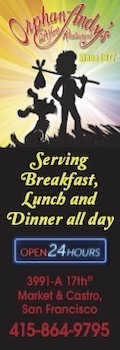Happy Lucky LGBTIQ Freedom Day!

By Stuart Gaffney and John Lewis–
Every year at Pride, we think of how lucky we are to be gay—as we also join with the community in rededicating ourselves to the ongoing struggle for full equality and dignity. This year, we’re particularly treasuring the unique perspective being LGBTIQ gives us on the constructs of gender and how it provides LGBTIQ people the opportunity to live inwardly and outwardly free from the constraints of gender.
We both grew up in Middle America in the 1960s and 70s, when gender norms were much more rigid than they are today. We were fortunate to have parents who themselves to varying degrees did not conform to many of the gender stereotypes of the day.
John’s dad took it a step further. He questioned people’s ability to define gender at all. As a counseling psychology professor, he challenged his students to question all assumptions they might bring to a client in therapy and to their lives as well—including gender.
When friends or colleagues came over for dinner, just as we had all sat down at the table to eat he would ask the guests a question: “Do you know what sex you are?” As soon as they responded (always either male or female), he would retort: “How do you know?” Regardless of their answer, he always had further questions to expose their assumptions and undermine their confidence in their assertions. For instance, if a person responded that their chromosomes determined their gender, he would immediately reply: “Have you personally checked your chromosomes? And what about transgender people?”
John’s dad engaged in these inquiries with others to help expose broadly how assumptions people make about themselves, other people, and anything else in life are to some degree subjective, arbitrary, and not fully accurate. They don’t reflect direct, lived experience. He wanted his students to see that as therapists their unexamined assumptions could interfere with helping their clients. More generally, he sought to shed light on how assumptions, views, and opinions can limit human communication, connection, and ability to live life fully. He wanted people to understand the power of not judging others and not pre-judging situations.
Without realizing it, he was articulating the basis for what was happening in San Francisco, New York, Los Angeles, and some other parts of the country at the time: the movement then known as gay liberation and freedom—that today we call LGBTIQ Pride. At its heart lies freedom and liberation from the constraints of gender and consequently the unbound expression of our lives in all their beautiful dimensions.
Nearly 1,500 years earlier, the Bodhidharma, the legendary figure credited with bringing Zen Buddhism to China over the Silk Road, had made a similar assessment of gender. The Bodhidharma explained that the terms “male” and “female” are designations or descriptors of part of life, not fixed identities. The terms mean different things to different people at different times. He likened gender designations to labels people apply to nature such as “grass” or “trees” and myriad other parts of the physical world. He believed that people who see beyond the illusion of inherently fixed, predetermined gender identities have a greater insight into life.
As LGBTIQ people, we are lucky because one or more prominent elements of our lives—be it our love, sexual attraction, gender identity, appearance, way of thinking, or personal expression—defies the confines of the strict gender binary. We have the chance to see clearly through arbitrary definitions of gender and live more beautifully nuanced, complex, and creative lives than those dictated by strict gender norms. And we can help show the world that no one should have to live under artificial constraints.
For many of us, what the world calls “male” and “female” are dynamically at play within us. And what that interplay is capable of producing can be a gift to the world in ways big and small. Indeed, many Native Americans for millennia considered “Two Spirit” people to be a gift of supernatural intervention. We should all consider our own unique sexual orientation, gender identity, and expression to be that sacred.
Happy Gay Liberation Day, Happy LGBTIQ Freedom Day, Happy Pride!
Stuart Gaffney and John Lewis, together for over three decades, were plaintiffs in the California case for equal marriage rights decided by the California Supreme Court in 2008. Their leadership in the grassroots organization Marriage Equality USA contributed in 2015 to making same-sex marriage legal nationwide.
Published on June 24, 2021








Recent Comments